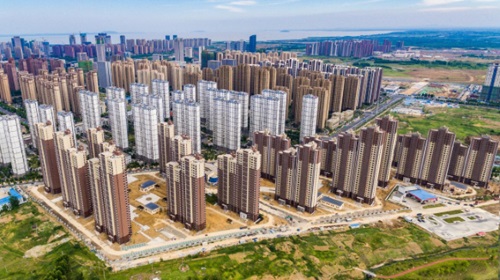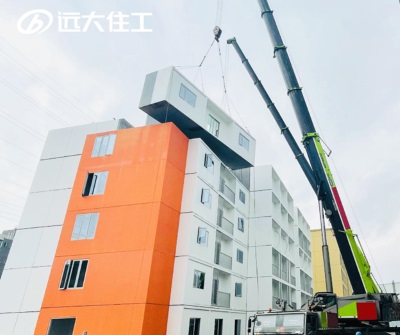HONG KONG, May 10, 2022 - (ACN Newswire) - Broad Homes and Tencent Cloud enter into strategic partnership to develop new opportunities in smart buildings.
 |
 |
Utilizing Broad Homes' whole-process digital information system and globalized, large-scale, specialized and intelligent assembly building manufacturing and service capabilities, as well as Tencent Cloud's advantages in the field of all-true interconnection, digital twin, enterprise digitalization, AI platform and cloud services, the two companies 'strategic cooperation will focus on market development, technical cooperation and product development to jointly innovate and create development opportunities.
In the future, Broad Homes and Tencent Cloud will together help more traditional enterprises to transform and upgrade. The two companies will carry out targeted cooperation and R&D in the fields of smart parks, smart communities, and true interconnection. Efforts will go towards creating key cooperation projects in the fields of intelligent construction, smart cities, industrial towns and digital upgrading of enterprises, and replicate and promote them nationwide to achieve wider and deeper strategic cooperation.
The regulation and control policies of the real estate industry are expected to be continuously relaxed, and affordable rental housing will drive the demand for prefabricated construction.
In 2021, China continued to increase its real estate regulation policies, and the regulation methods, intensity and detail were significantly upgraded. With the intensive introduction of a series of regulatory schemes to strengthen the prudent management of real estate finance, the real estate market suddenly cooled down. By the end of 2021, investment in China's real estate industry had recorded an annual growth rate of only 4.4%, lower than the 7% growth rate in 2020. In the first half of 2021, the number of new construction projects was relatively strong. However, due to the release of the pressure of regulatory measures in the second half of the year, the year-on-year decline was 11.4%.
Since this year, the government issued several easing policies for the real estate industry. On the one hand, it has reversed residents' expectations, on the other hand, it has encouraged real estate investment and guided the industry to develop steadily in a positive and healthy direction through policies. For the prefabricated construction industry, the development goals of affordable rental housing, building energy conservation and green building have been issued recently, which provides a strong catalyst for industry development in the coming years. At the same time, the Ministry of Housing and Urban-Rural Development announced clear targets for affordable rental housing in 40 key cities during the 14th Five-Year Plan period. It plans to build 1.9 million new affordable rental housing units by the end of this year and 6.5 million new units by 2025, hoping to resolve housing difficulties of 13 million people. According to market analysis, the new plan of affordable rental housing will benefit the construction demand of prefabricated buildings and accelerate industry development. The benefit comes from the two advantages of prefabricated buildings: 1) shorter construction cycle in comparison to traditional construction methods; 2) reduction in overall labor cost and environmental burdens. For developers, the shortening of the construction cycle is very important, because expedited delivery will allow earlier generation of rental income. According to the calculation of Everbright Securities, if the rental price of affordable housing is estimated to be 40 RMB/m2 per month, and if construction period for building structure and decoration is shortened by 9 months, the corresponding rental value will be 360 RMB/m2. Under current industry circumstance with price of prefabricated buildings equaling that of traditional buildings, there is no doubt that prefabricated building is a more valued method of construction.
In March this year, the Ministry of Housing and Urban-Rural Development released the "14th Five-Year Plan for the Development of Energy Efficient and Green Buildings", further clarifying the country's determination to promote high-quality development of green buildings. The plan states that by 2025, prefabricated buildings will account for 30% of newly built housing in cities and towns (the ratio was 9.1% in 2018). The policy clarified the need for green and low-carbon construction in the county and how assembled modular buildings can be well adapted to modernize the construction of farm houses and villages to create green and low-carbon villages.
Specific targets for building energy efficiency and green building development in the "14th Five-Year Plan" period
Main Targets / By 2025
Energy saving reconstruction area of existing buildings (100 million m2) / 3.5
Construction area of ultra-low energy consumption and near zero energy consumption (100 million m2) / 0.5
Proportion of prefabricated buildings in new urban buildings / 30%
Proportion of electricity consumption in building energy consumption / 55%
Broad Homes is a leader in China's prefabricated construction industry, promoting multifaceted growth.
Broad Homes is the first prefabricated construction stock to IPO in Hong Kong, which was officially listed on the Main Board of Hong Kong Stock Exchange in November 2019. Broad Homes is a leading company in the prefabricated construction industry. The industry is highly policy driven and increase in market demand helps to drive down costs of prefabricated construction. The current price competition in the prefabricated construction industry is fierce, and the price of some assembled buildings is getting closer to that of traditional cast-in-place constructed buildings, which is one of the signs of rapid industry growth.
After the impact of the COVID pandemic and overall industry downturn in 2021, Broad Homes recently submitted a solid financial report. As of December 31, 2021, Broad Homes reported total revenue of RMB 3.059 billion, up 21.8% year-over-year with solid operating cash flow and cash reserves. In addition, on January 17, 2022, Broad Homes reported that both new contracts signed and outstanding contracts at hand in 2021 reached record highs, with the total value of new contracts signed for the PC business in 2021 increasing by 20.9% year-on-year to RMB4.947 billion and the total value of outstanding contracts in hand increasing by 24.1% year-on-year to RMB6.448 billion, with solid profitability estimates.
In March 2021, Box MODUL (Broad Homes 'modular integrated product) was officially released, which is a prefabricated and modular residential finished product produced by making full use of prefabricated construction technology. The product was launched in July and started to ramp up by September 2021. In less than six months, the product was delivered to 16 provinces, involving innovative application scenarios of cultural tourism, public, office, medical and other scenes. According to the data, as of December 31, 2021, Broad Homes obtained RMB154 million of newly signed contracts and realized RMB82 million of revenues. At the same time, the company's B-House series have also achieved good growth in demand with the help of the recent frequent introduction of affordable rental housing policies and rural revitalization targets.
Copyright 2022 ACN Newswire. All rights reserved. www.acnnewswire.com





